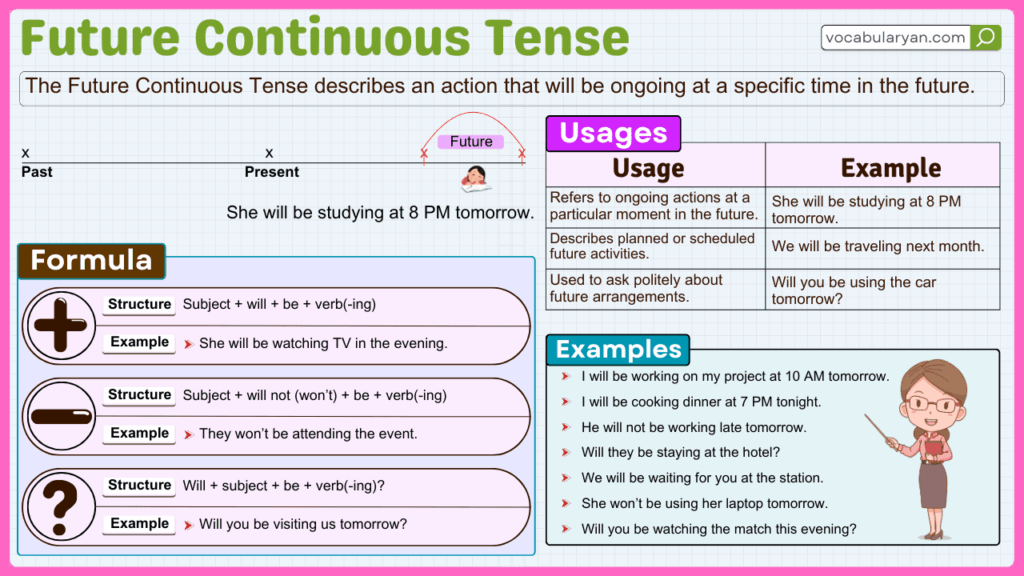Learning the Future Continuous tense is important for describing actions that will be ongoing at a specific time in the future. It is formed using will be + verb + -ing, such as “She will be studying at 8 PM” or “They will be traveling tomorrow afternoon.” This tense helps explain future plans or events in progress. Mastering the Future Continuous tense improves your ability to talk about upcoming situations clearly and confidently in both speaking and writing.
Sentence Structure
The Future Continuous Tense is formed using: Subject + will be + verb-ing
Affirmative
Structure: Subject + will be + verb-ing
- She will be studying at this time tomorrow.
- They will be traveling to London next week.
Negative
Structure: Subject + will not (won’t) be + verb-ing
- He won’t be attending the meeting.
- We won’t be playing football in the evening.
Interrogative
Structure: Will + subject + be + verb-ing?
- Will you be working on Sunday?
- Will they be arriving late?
Double Interrogative
Structure: Question word + will + subject + be + verb-ing?
- What will she be doing at 5 PM?
- Where will they be staying next month?
Subject-Verb Agreement
A correct subject-verb agreement ensures that sentences follow proper grammatical rules.
| Subject | Helping Verb (will be) |
|---|---|
| I | will be |
| You | will be |
| He/She/It | will be |
| John (name) | will be |
| The teacher (profession) | will be |
| My father (relationship) | will be |
| We | will be |
| They | will be |
| The dogs (plural) | will be |
Time Expressions for Future Continuous Tense
Using time expressions of future continuous tense correctly makes sentences more meaningful and accurate.
At this time tomorrow:
- I will be sleeping at this time tomorrow.
Next week:
- They will be attending a conference next week.
In an hour:
- She will be preparing dinner in an hour.
By this evening:
- We will be arriving by this evening.
Tomorrow morning:
- He will be jogging tomorrow morning.
At midnight:
- They will be driving home at midnight.
By next month:
- She will be working in a new office by next month.

Adverb Placement in Future Continuous Tense
Correct placement of adverbs helps in delivering the intended meaning of a sentence. Adverbs like always, constantly, still, definitely, surely are placed before be or after verb-ing.
- She will definitely be waiting for you.
- They will be working constantly to meet the deadline.
- He will still be thinking about it by tomorrow.
- We will surely be arriving on time.
- You will be learning quickly with practice.
Uses of Future Continuous Tense
Understanding the different applications and uses of the Future Continuous Tense enhances fluency and precision in communication.
Ongoing Future Actions:
- She will be studying at 8 PM.
Parallel Future Actions:
- While I will be cooking, he will be watching TV.
Assumptions about the Future:
- He will be sleeping now (in the future context).
Polite Inquiries:
- Will you be joining us for dinner?
Future Plans and Arrangements:
- They will be meeting the client next Monday.
Interruptions in the Future:
- I will be working when you call me.
Emphasizing Duration in the Future:
- By next year, he will be studying medicine for three years.
Short Answers
Short answers avoid repetition and make communication more natural.
| Question | Short Answer |
|---|---|
| Will she be coming? | Yes, she will. / No, she won’t. |
| Will they be arriving soon? | Yes, they will. / No, they won’t. |
| Will your father be watching TV? | Yes, he will. / No, he won’t. |
| Will the dogs be barking? | Yes, they will. / No, they won’t. |
Question Tags
Used to confirm information, question tags help in keeping conversations interactive.
| Statement | Question Tag |
|---|---|
| She will be working, | won’t she? |
| They won’t be attending, | will they? |
| John will be coming, | won’t he? |
| The teachers will be teaching, | won’t they? |
Examples of Future Continuous Tense
Here are some examples of Future Continuous Tense:
- We will be waiting for the bus.
- He will be fixing the car.
- I will be attending a workshop.
- She won’t be sleeping at that time.
- They won’t be going to the market.
- He won’t be cooking dinner.
- Will they be arriving early?
- Will he be playing the guitar?
- Will we be leaving soon?
Common Mistakes in Future Continuous Tense
Here are some of the most frequent mistakes:
- She is sleeping at 10 PM.❌
- She will be sleeping at 10 PM.✅
- He will go to school at 9.❌
- He will be going to school at 9.✅
- They will playing football.❌
- They will be playing football.✅
- She won’t coming to the party.❌
- She won’t be coming to the party.✅
- She will being late.❌
- She will be late.✅
- We will arrive at 8 PM.❌
- We will be arriving at 8 PM.✅
You May Also Like
